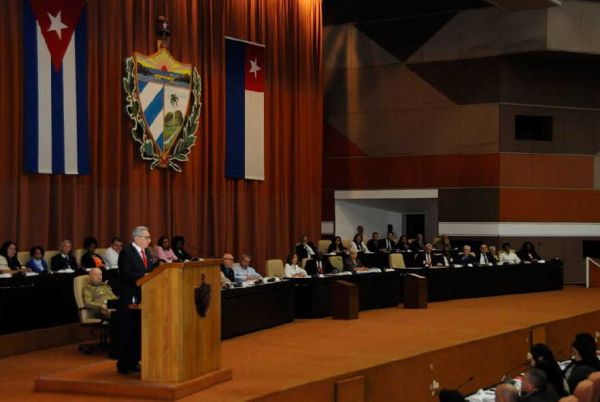
Army General Raúl Castro, first secretary of the Central Committee of the Communist Party of Cuba, delivered the speech for the proclamation of the new constitution
Cuba proclaimed this April 10 its new Constitution at an extraordinary session of the National Assembly of People’s Power marked by a great symbolism by the remembrance of the first Magna Carta of the Republic in Arms, whose 150th anniversary is celebrated today.
The session, in which Miguel Díaz-Canel, president of the Councils of State and Ministers, was also present, began with the greeting of the nation and the firing of 21 salvoes from the San Carlos de la Cabaña Fortress, in Havana, and the Santa Ifigenia Cemetery, in Santiago de Cuba.
In the hall, the proclamation ceremony was accompanied by the original constitutional text of Guáimaro, while in that town in the central province of Camaguey several commemorative activities were carried out coinciding with the Parliament ceremony.
Esteban Lazo Hernández, president of the National Assembly of People’s Power, said that the new Magna Carta is inspired by the heroism and patriotism of those who fought for a free, democratic and socially just Homeland.
The president of the National Electoral Commission, Alina Balseiro, reported that more than 6.8 million Cubans -78.3% of voters with the right to vote- said yes to the text submitted to a referendum, a process that took place in accordance with the law. Therefore, the people of Cuba, in sovereign exercise, ratified the new Constitution of the Republic last February 24.
On this day, the Magna Carta was also published in the Official Gazette,
which means its entry into force and the beginning of the process of implementation of its transitional provisions, which, as explained by the Army General, is working towards its culmination in 2020.
The Cuban Parliament will continue its work on April 11 and 12 in the Standing Committees, and on Saturday, April 13, an extraordinary session will take place to analyze economic and social issues.
 Escambray ENGLISH EDITION
Escambray ENGLISH EDITION





Escambray reserves the right to publish comments.